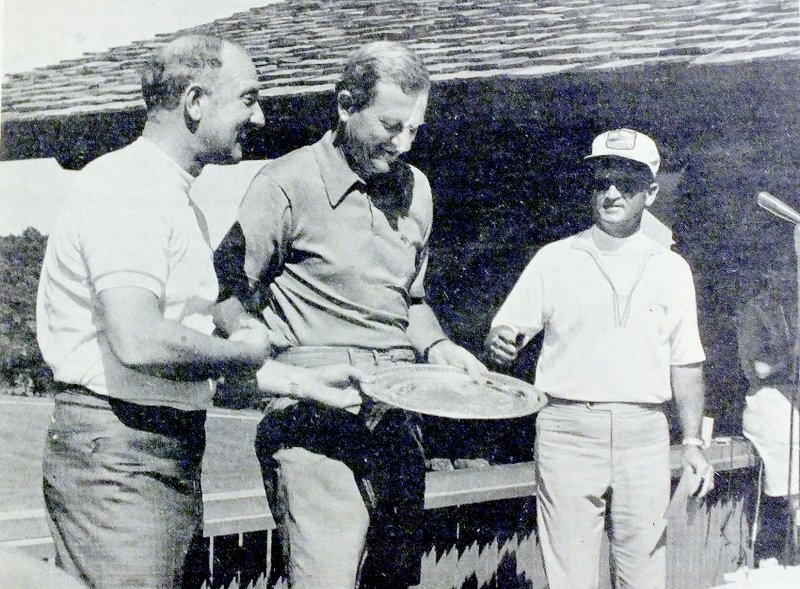Golf has its own storied history in the annals of Bella Vista.
Alongside swimming, golf was the resort's primary recreational attraction in the 1920s, according to information from the Bella Vista Historical Museum. After the Linebarger brothers purchased the resort in 1917 from the Rev. William and Mary Baker, a nine-hole course was established near the banks of Lake Bella Vista. The course covered much of where U.S. 71 runs today.
During the Linebargers' 35-year reign, guests flocked in droves to spend their summers in the Ozarks.
E.L. Keith purchased the resort in 1952. Keith expanded and improved Bella Vista's amenities, which included building a miniature golf course for kids.
But it wasn't until John A. Cooper Sr. purchased the resort in 1963 that Bella Vista became synonymous with golf royalty.
Cooper envisioned Bella Vista as an active retirement community, according to Gilbert Fite's book "From Vision to Reality: The History of Bella Vista Village, 1915-1992." Cooper had established Cherokee Village, essentially the prototype for Bella Vista, in northeast Arkansas in the mid 1950s. He believed a similar community could be successful in the Ozarks, Fite wrote.
In February 1965, only 13 months after Keith sold the property, Cooper held a press conference announcing his plans for "a new recreational-retirement community called 'Bella Vista Village,'" Fite wrote. Cooper's landmark announcement included plans for a grand clubhouse and 18-hole championship golf course, according to Fite. Cooper called both items "the very center of the development."
An avid golfer, Cooper had established a golf tournament that he co-hosted with Arkansas head football coach Frank Broyles. The National Coaches Invitational Tournament had its inaugural event in 1965 at Cherokee Village, according to a report from the July 1970 Village Vista -- the predecessor to The Weekly Vista.
The tournament featured high-profile coaches from the country's top football programs, Cooper employees and local and national sports journalists. Upon completion of the Bella Vista Country Club in 1968, the tournament moved to Bella Vista in 1969 from Cherokee Village.
By 1970, the event was the official invitational tournament of the American Football Coaches Association, according to the Village Vista.
The coaches tournament was discontinued after 1972, and it would take more than a decade before another tournament with equal pizzazz emerged.
In 1986, John Phillips established the Phillips Classic. Phillips was president of Phillips Company, which operated Phillips Foods, a regional grocery store chain with a branch at Town Center in Bella Vista, according to Xyta Lucas, a docent at the Bella Vista Historical Museum.
The Phillips Classic sought to raise money for cancer research and support, Lucas said. The classic "invited celebrities and corporate representatives to join local people in two or three days of fun-filled activities," Fite wrote. Popular activities included golf and tennis tournaments, races, fishing and cookouts.
In its first year, the Phillips Classic raised $20,000, with the proceeds going to cancer treatment facilities and research. By the end of the decade, the Phillips Classic was a star-studded affair, featuring the likes of Bill Clinton, Nolan Richardson and Sam Walton.
In 1992, 1,200 Bella Vistans volunteered to help the Phillips Classic meet its fundraising goal of $1 million.
But the tournament ended abruptly in 1993. In July, Phillips announced that the event was being discontinued, according to a report in the August 1993 Village Voice.
Phillips' decision came after much "thought, discussion and soul-searching," according to the article, but no official reason was ever given.
Over its eight years, Phillips Classic helped raise a total of $4.5 million for cancer work, according to the Village Voice.
But by 1994, work was under way to establish another event to keep up in the fight against cancer. Ray Kelly led a Bella Vista steering team to form the Cancer Challenge, according to a report from Benton County Daily Record. To distinguish itself from the defunct Phillips Classic, the Cancer Challenge focused on the events, rather than celebrities, according to the Daily Record.
The event is a vital source of fundraising for cancer care, research and support. This year's challenge ran from June 11-13, and opened with a trapshooting tournament at the Highlands Gun Range. A tennis tournament, golf tournament and run also were held.
More than 100 shooters forming 36 teams competed, according to chairman Ace Moreland. Shooters traveled to Bella Vista from across the country, trekking from New York, Illinois, Texas and California. The event was broken into morning and afternoon sessions, with each team firing 100 rounds, Moreland said.
Ray Austin, Roye Albritton and Mike Tucker of Walmart Team 5 won the 2015 tournament. The trio combined for a total of 285. Tucker missed only two targets, finishing with a near-perfect score of 98 out of 100. Only three other shooters, James Yerks, Sam Weaver and Roger Cravens, scored that high.
"Our mission is to provide world-class cancer care in northwest Arkansas," said Erin Rongers, executive director of Cancer Challenge. "The annual event is the driving force behind it. Last year we raised $757,000 and hope to do the same or better this year."
The challenge is unique because of its adherence to local needs, Rongers said.
"(The funds go) right back into the community," she said. "We've affected nearly 25,000 people with prevention, survivorship, education and treatment navigation. Those are our pillars."
Cancer Challenge doesn't work directly with cancer patients, Rongers said. Instead the organization provides grants to local charities, hospitals and clinics that aid patients and survivors.
The organization awards grants to help patients who need help getting to doctor's appointments, supply wigs and prosthetics and even an exercise program at the YMCA, specifically set up for cancer survivors, Rongers added.
General News on 06/24/2015
